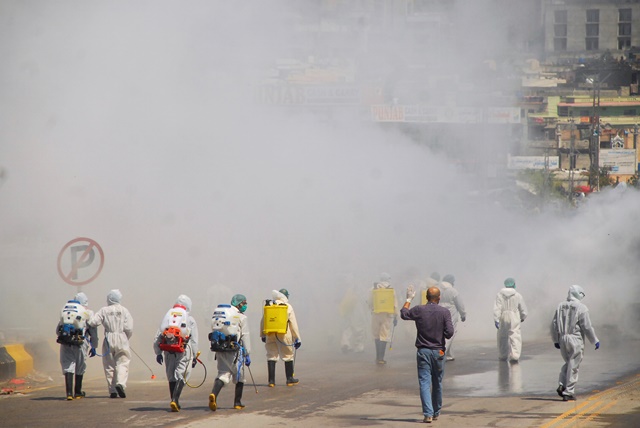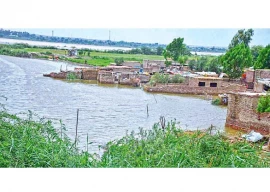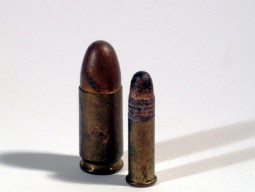
After 10 days, Rimsha Colony de-sealed
Remaining two sealed areas await clearance from health authorities
RAWALPINDI/ ISLAMABAD: Nearly 10 days after medical crews wearing white protective suits backed by squads of the army, paramilitary Rangers and the police rolled into the area and sealed it, the Rimsha Colony locality in Sector H-9 was de-sealed on Wednesday.
The remaining two localities of the federal capital which have been sealed, Bhara Kahu and Shehzad Town, are awaiting clearance from the health authorities to be de-sealed.
A notification in this regard was issued by the Islamabad Capital Territory Administration (ICTA) Deputy Commissioner (DC) Hamza Shafqaat on Wednesday.
The notification read that the district health officer had declared the area as clear of the novel coronavirus (Covid-19) infection.
Rimsha Colony, a slum, had been sealed on March 23 after a Covid-19 positive patient emerged there.
The district administration, with support from law enforcing agencies (LEAs), placed pickets on all the entry and exit points to the area. They screened all residents of the locality while washing the streets with chlorinated water and disinfecting them.
With no suspected Coivd-19 case being reported from the area in the past 10 days, the restrictions imposed on the area were lifted.
Following the notification, police and other security personnel deployed at the entry points of the area withdrew.
Two other sealed areas of the federal capital, Shehzad town and Bara Kahu, remain under strict lockdown.
Walk-through gates at Sabzi Mandi
To make a visit to the main vegetable and fruit market of the city safe, the first sanitising walk-through gate of the federal capital was installed at the vegetable market on Wednesday.
Special Assistant to the Prime Minister on Capital Development Authority (CDA) Affairs and an MNA from the federal capital Ali Nawaz Awan, inaugurated the gate and said that they intended to install 20 such gates at multiple locations across the city, including at the entrance to mosques and other public places.
Each gate, he said, costs Rs200,000.
Advising the public to avoid mass gatherings for some time so that the country can protect itself from the pandemic, Awan reiterated, “ stay home to stay safe.”
Meanwhile, people continued to throng the vegetable market and adjoining areas of the city with police and administration doing little to fully enforce the lockdown.
To ease congestion in the market, the Islamabad Capital Administration (ICT) with assistance from the Capital Development Authority (CDA), launched an operation against encroachments and hand carts in the market.
The hand carts were moved outside the Sabzi Mandi and allowed to resume after ensuring that there was a minimum gap of six meters between each hand cart.
Officials said that the operation will continue for the next two weeks.
Furthermore, awareness through loudspeakers is also being created among the people about maintaining social distancing and ways to curb the spread of coronavirus.
Flour crisis eases
A potential flour crisis in Rawalpindi, which had seen an increase in prices of the essential commodity, eased on Wednesday as the district administration started selling flour at different locations of the garrison city.
Rawalpindi Deputy Commissioner (DC) Captain (retired) Anwaarul Haq held a meeting with flour mill owners on Wednesday. Consequently, some 19 flour mills, located in different areas of the district, set up 38 stalls outside their respective factories, where they are selling flour on ex-mill prices of Rs800 per 20-kilogramme sack of flour.
Meanwhile, the district administration rented trucks stationed on different roads and thoroughfares to transport sacks of flour to the city centre to sell them at the official rates.
All these spots were visited by the price magistrates. Special Judicial Magistrate Muhammad Iqbal said that the trucks will remain parked and sell flour daily until the situation normalises. Following the supply of flour, prices of the commodity fell in the markets with a 10-kg bag of flour being sold for Rs 400.
Verdict reserved
The Islamabad High Court (IHC) on Wednesday reserved its verdict on whether a petition, which urges the court to direct the government to supply essential commodities to residents of the Islamabad Capital Territory (ICT) at their doorsteps during the lockdown, will be heard or not.
IHC Chief Justice Ather Minallah heard arguments on the maintainability of the petition, filed by a citizen, through his counsel Abdul Rehman on Wednesday.
The lawyer argued that since all hotels and eateries have been closed in the federal capital, the government must be directed to deliver essential items such as food, clothes, and medicines to people at their doorsteps.
CJ Minallah asked if the petitioner was aware of the limit of the state’s resources and further inquired if people are fulfilling their responsibilities in the wake of the novel coronavirus (Covid-19) pandemic.
The court remarked that nations unite in the difficult times but lamented that this has not been apparent in the country thus far.
He further contended that in many countries, where the lockdown was far stricter than in Pakistan, the people were facing the challenge together by coming forward to help each other. The court said that instead of raising controversial issues, the nation should stand together during the time of crisis
Published in The Express Tribune, April 2nd, 2020.















COMMENTS
Comments are moderated and generally will be posted if they are on-topic and not abusive.
For more information, please see our Comments FAQ